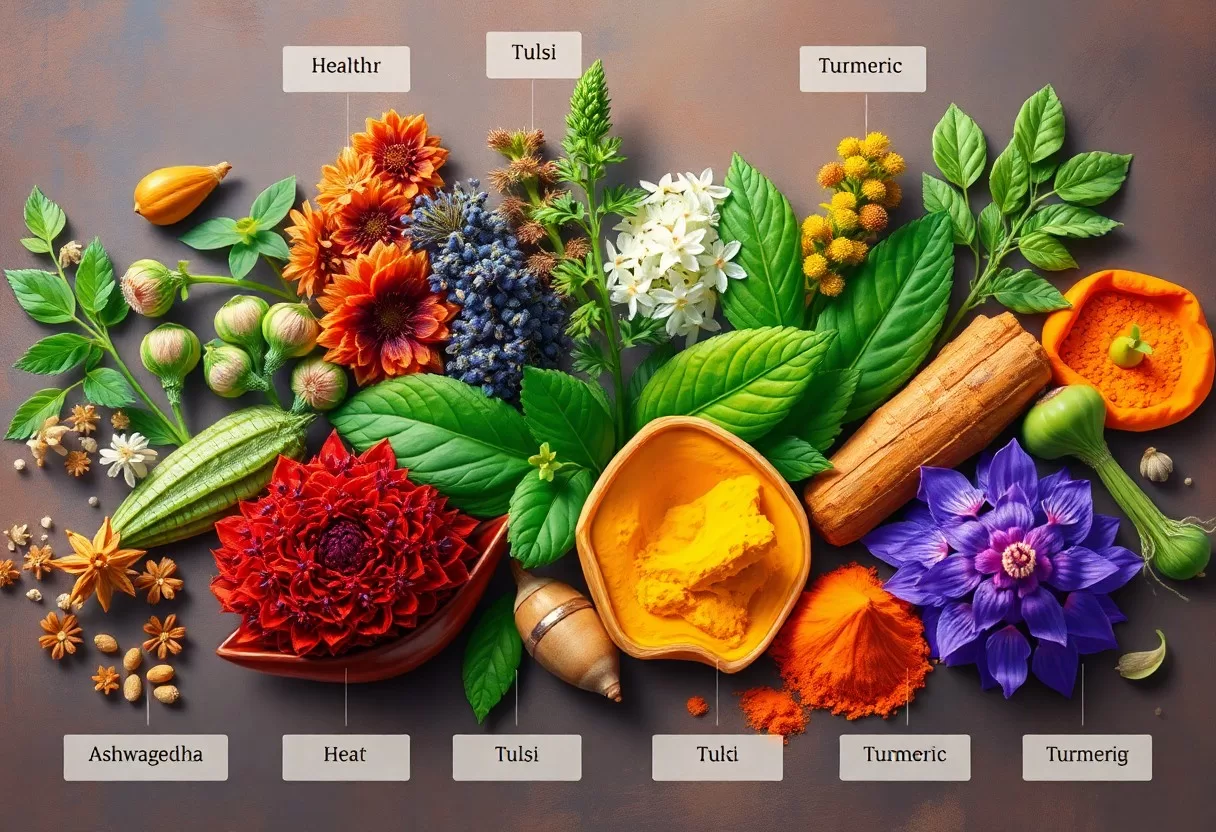Ayurveda offers a holistic approach to health, harnessing the power of natural herbs to promote well-being and balance in your life. By integrating these time-tested herbs into your routine, you can experience a variety of health benefits, including enhanced immunity, better digestion, and improved mental clarity. Whether you are seeking to alleviate specific ailments or simply looking to support your overall health, understanding the unique properties and uses of these herbs can empower you to take charge of your wellness journey. Let’s explore the fascinating world of Ayurvedic herbs and their remarkable benefits.
Key Takeaways:
- Holistic Health: Ayurvedic herbs are used not only for treating specific ailments but also for promoting overall well-being, balancing the body, mind, and spirit.
- Natural Remedies: Many Ayurvedic herbs, such as Ashwagandha, Turmeric, and Brahmi, possess anti-inflammatory, antioxidant, and adaptogenic properties that support various health functions.
- Personalized Approach: Ayurveda emphasizes individualized treatment; the benefits of herbs can vary based on each person’s unique constitution or dosha, requiring tailored applications for maximum efficacy.

Overview of Ayurveda
For thousands of years, Ayurveda has offered a holistic approach to health, focusing on balancing one’s body, mind, and spirit. Originating in India, it emphasizes the interconnectedness of life and encourages you to nurture your overall well-being through natural remedies and lifestyle changes. This ancient system of medicine integrates diet, herbal treatments, and specific exercises to promote harmony within yourself, helping you achieve optimal health.
Historical Context
Beside its rich legacy in the Eastern world, Ayurveda is one of the oldest medical systems known to humanity, dating back over 5,000 years. Its practices and principles have been documented in ancient texts such as the Vedas, and it has evolved through generations, drawing from the wisdom of various cultures. Sharing insights on health, wellness, and herbal remedies, Ayurveda continues to influence modern practices as a source of sustainable healing.
Principles of Ayurvedic Medicine
Among its key principles, Ayurveda stresses the balance of the three doshas: Vata, Pitta, and Kapha, which represent different physical and emotional characteristics in each individual. Understanding your unique dosha composition is vital for achieving well-being, as it enables you to tailor your lifestyle, diet, and treatments for optimal health.
Indeed, Ayurveda operates on the belief that if your doshas are imbalanced, you may experience physical ailments or emotional distress. This system encourages you to identify your dosha and make informed lifestyle choices. By doing so, you can promote health and harmony throughout your body. Moreover, Ayurveda emphasizes the importance of personalized healing, guiding you to suitable herbs and treatments that work best for your individual needs. Embracing these principles empowers you to foster a deeper connection with your health and unlock your full potential for well-being.
Common Ayurvedic Herbs
One of the most noteworthy aspects of Ayurveda is its rich repository of herbs, each offering unique health benefits. These common Ayurvedic herbs, such as Ashwagandha, Turmeric, Tulsi, and Triphala, have been used for centuries to promote wellness and balance within the body. Incorporating these herbs into your daily routine can enhance your overall vitality and bolster your immune system.
Ashwagandha
The powerful adaptogen Ashwagandha is celebrated for its ability to reduce stress and anxiety, promoting a sense of calm and mental clarity. This herb supports adrenal health and may help you achieve emotional balance in your busy life.
Turmeric
For centuries, Turmeric has been revered for its extraordinary medicinal properties, largely attributed to its active compound, curcumin. This vibrant yellow spice is widely recognized for its anti-inflammatory and antioxidant effects, which can significantly benefit your overall health.
At the cellular level, curcumin helps combat oxidative stress and may lower the risk of chronic diseases, including heart disease. Additionally, its anti-inflammatory properties make turmeric an excellent ally for joint health and pain management. Including turmeric in your diet can help you harness its myriad benefits and support your wellness journey.
Tulsi (Holy Basil)
Turmeric is often regarded as the “queen of herbs,” but Tulsi, also known as Holy Basil, holds its own among Ayurveda’s finest. This revered herb is cherished for its ability to enhance your body’s resilience to stress and promote emotional well-being.
Due to its adaptogenic properties, Tulsi can help you manage stress more effectively and may enhance immune response. This herb is also rich in antioxidants and may contribute to heart health and respiratory function. Incorporating Tulsi into your daily routine can be a natural way to support your mental clarity and emotional stability.
Triphala
Against common digestive issues, Triphala is a powerful herbal formula that combines three fruits: Amalaki, Bibhitaki, and Haritaki. This blend is known for its ability to promote gastrointestinal health and detoxification.
Ayurvedic practitioners often recommend Triphala for maintaining digestive balance and regularity. Its synergistic effects help cleanse the digestive tract, while the antioxidant properties support overall health. Incorporating Triphala into your regimen can help you achieve a harmonious balance in your digestive system and overall wellness.
Benefits of Ayurvedic Herbs
Unlike conventional medicines, What Is Ayurveda? Treatments, Massage, Diet, and More highlights the balancing effects of Ayurvedic herbs, which can harmonize your body and mind. These herbs not only cater to physical health but also enhance mental well-being, immune support, and digestive health, allowing for a holistic approach to wellness.
Physical Health
At the core of Ayurvedic practice, your physical health can significantly improve through herbal remedies. Integrating herbs such as Ashwagandha and Turmeric can help reduce inflammation, enhance vitality, and promote overall body balance.
Mental Well-being
Against stress and anxiety, Ayurvedic herbs like Brahmi and Jatamansi can enhance clarity and focus. These botanicals support cognitive functions and help in mitigating the effects of a fast-paced lifestyle.
Considering the demands of everyday life, your mental well-being deserves attention. Incorporating calming herbs into your routine can support emotional resilience, allowing you to manage stress effectively and improve your overall mood.
Immune Support
Wellbeing thrives when your immune system is fortified. Ayurvedic herbs such as Tulsi and Neem help to bolster immune response, providing you with enhanced protection against common illnesses.
Further, understanding how to strengthen your immune system is vital. Regular intake of these potent herbs can provide you with the necessary antioxidants to combat various pathogens, thus enabling a robust defense mechanism in your body.
Digestive Health
Ayurvedic practices emphasize the importance of digestive health, utilizing herbs like Ginger and Triphala to promote a healthy gut. Such herbs enhance digestion and help alleviate discomfort.
In addition to aiding digestion, these herbs work synergistically to detoxify your body. By fostering a balanced digestive environment, you can experience improved metabolism, nutrient absorption, and an overall sense of vitality.
Using Ayurvedic Herbs
Now, it’s imperative to incorporate Ayurvedic herbs thoughtfully into your daily routine. These natural remedies can significantly enhance your overall well-being when used appropriately. By understanding the various applications and preparation methods, you can tailor your use of these herbs to meet your specific health needs and preferences, thereby unlocking their full potential in promoting balance and vitality in your life.
Preparation Methods
Around the world, various preparation methods exist for Ayurvedic herbs, including infusions, decoctions, powders, and pastes. Each method has its advantages and can enhance the bioavailability of the herbs’ active compounds. By choosing the right preparation method, you can optimize their benefits and ensure that your body effectively absorbs the healing properties of these powerful plants.
Dosage and Usage Guidelines
Ayurvedic herbs must be used with caution, paying close attention to the recommended dosages and usage guidelines. Knowing the right amount is key, as herbal remedies can be potent and their effects may vary depending on individual health conditions. Always consult a knowledgeable practitioner or reliable resources before starting a new herbal regimen to ensure safe and effective use.
In fact, it’s imperative to understand that improper dosing of Ayurvedic herbs can lead to adverse effects or ineffective results. The therapeutic dose of herbs can differ based on your body type, age, and health conditions. Start with smaller amounts and gradually increase as you monitor your body’s response. Following established guidelines and seeking professional advice are imperative practices that will help you harness the full power of Ayurvedic herbs while minimizing potential risks.
Safety and Considerations
To ensure a safe experience with Ayurvedic herbs, it’s imperative to consult with a healthcare professional before incorporating them into your routine. Each individual can react differently to these herbs based on factors such as existing health conditions, allergies, and other medications you may be taking. Monitoring your body’s response and making informed decisions can help you safely enjoy the many benefits these natural remedies offer.
Possible Side Effects
The use of Ayurvedic herbs might lead to side effects for some individuals, including gastrointestinal distress, skin reactions, or allergic responses. It’s vital to start with lower doses and gradually increase to monitor how your body reacts. If any adverse effects occur, discontinue use and consult a healthcare provider.
Interactions with Western Medicine
About Ayurvedic herbs and their potential interactions with Western medicine, you should always be cautious. Some herbs can intensify or diminish the effects of prescription medications, leading to unexpected health outcomes. It is imperative to inform your healthcare provider of any Ayurvedic herbs you are using, as this can help avoid possibly harmful interactions and ensure your treatment plan is safe.
With the growing popularity of Ayurvedic medicine, many individuals may not be aware of how certain herbs interact with traditional medications. For instance, some herbs can enhance the effects of blood thinners, potentially increasing the risk of bleeding, while others may reduce the efficacy of medications for diabetes, leading to fluctuating blood sugar levels. Always discuss the inclusion of Ayurvedic remedies with your doctor for a safer, more integrated approach to your health.
Final Words
The knowledge of Ayurvedic herbs can significantly enhance your health and well-being by tapping into nature’s bounty. By integrating these powerful botanicals into your daily routine, you can support various aspects of your physical and mental health, promoting balance and vitality. Whether you seek to boost immunity, manage stress, or improve digestion, these herbs offer a holistic approach that aligns with your body’s unique needs. Embrace the wisdom of Ayurveda to nurture not only your body but also your mind and spirit.
Q: What are some commonly used Ayurvedic herbs and their primary benefits?
A: Commonly used Ayurvedic herbs include Ashwagandha, which is known for its ability to reduce stress and improve overall health; Turmeric, renowned for its anti-inflammatory properties and support for joint health; and Triphala, a blend of three fruits that aids digestion and detoxification. Each of these herbs offers unique benefits that contribute to physical and mental well-being and can be incorporated into daily routines for holistic health.
Q: How do Ayurvedic herbs support mental clarity and emotional balance?
A: Many Ayurvedic herbs are recognized for their adaptogenic properties, which help the body adapt to stress and promote mental clarity. For example, Brahmi is a herb often used to enhance cognitive function and memory, while Jatamansi calms the mind and assists in emotional balance. Including these herbs in your diet or as supplements can support mental health by reducing anxiety, improving focus, and fostering emotional stability.
Q: Can Ayurvedic herbs be safely combined with other treatments for chronic conditions?
A: Ayurvedic herbs can often be integrated into treatment plans for chronic conditions, but it’s important to consult with a healthcare professional before combining them with conventional medications. Herbs like Guggul may support metabolic health, while Neem can enhance immune function. A trained practitioner can provide guidance on appropriate combinations and dosages, ensuring safe and effective use in conjunction with other therapies.

